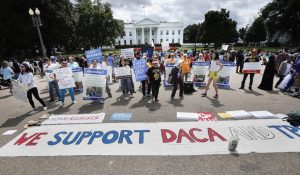At last! Finally, campaigns are recognizing the importance of Latino power in elections and the future of the United States. Except for the hate and excluding speech fostered at the White House, efforts are underway to empower our communities and respond to their needs and priorities.
The Latino agenda in the US goes beyond the migration topic. Let us see: Hispanics own 14% of small US businesses, and Latinos found almost a third of new companies. The Latino population in the US contributes $2.7 trillion to the nation’s GDP. Furthermore, undocumented immigrants, far from being a social burden, pay $23 billion to federal taxes and $12 billion in state taxes. Nine of those billions paid in federal taxes were withheld payroll taxes accounted by the employers under false social security numbers, which prevents the employees from capitalizing on the benefits associated with those contributions in health and pensions. Finally, we have the young DREAMers—a formidable human capital of over 3.6 million people, whose education was an investment and where they proved to excel in all fields of knowledge. No respectable society could block the path to citizenship to that magnitude of talent after having formed it, among other things, as citizens in all orders but without a document to affirm it.

Polls conducted to the Latino community reveal many aspects of their reality, which must be thoughtfully considered by our leaders if there is indeed a plan to take on the Latino agenda. This agenda, in essence, is nothing different from the American Dream of the middle and working classes. Hispanics’ priorities are accessible, and affordable healthcare and education systems for the ordinary citizen. 44% of the Latino population is millennial, a demographic group very concerned with environmental sustainability and civil rights. These rights not only include those for people of color but also women’s rights (for example, there is an immense population of Latinas that receive healthcare attention thanks to Planned Parenthood), as well as the inclusion and recognition of the LGBTQ community.
Three fundamental points must be present in the discussion of a Latino agenda and be a priority in this electoral cycle. The first two are of particular relevance for Hispanic Diasporas, mainly established in Florida: the future of the relationship between the US and Puerto Rico, and a protagonist consideration of the Ibero-American agenda in US Foreign Service. It is time to demand, from those who aspire to lead the country, a holistic and long term vision that provides a dignified and sustainable future to recognize all rights to Puerto Ricans; and allows to build a hemispheric alliance to capitalize the fabulous opportunities that the geographical triangle that unites the US, Spain, Portugal and all of Latin America and the Caribbean. Since the time of John F. Kennedy, nobody has had an ambitious and viable proposal around that reality.
The third matter is the economic empowerment of Hispanics. The country should start by revising the wage gap in the US (raise the federal minimum wage), without discounting workforce training and development programs. Furthermore, it should provide initiatives for the incubation, acceleration, and financial inclusion of small businesses of Hispanic capital. The potential of Latino entrepreneurship in the US is a dimension yet to be considered in public policy. The economic growth and expansion potential is enormous. Some studies indicate that a migratory reform that created a path to citizenship would propel economic growth by at least 1.5% every year. By embracing an economic empowerment policy for Hispanics focused on new businesses and those with less than five million dollars in sales, the global economic growth impact of the country, and Hispanic women’s economic empowerment, the annual GDP growth could be two percentage points higher. That number would be even more significant if we add opportunities for growth and exchange to the Latin American market that this vigorous economic segment would offer, with adequate government support and intelligent initiatives of economic diplomacy.

In 2020, 30 million Hispanics will be eligible to vote (currently 20 million are registered and 12 million exercises it). Though it is already a deciding factor, the Latino vote is also a sleeping giant. Whoever wished to mobilize and capitalize the Latino vote should leave behind the prefabricated discourse of years past and respond with vigor to the systematic attacks Trump directs to our people. Moreover, they have to assume proposals beyond migration and offer an economic and international agenda in which Hispanics and Latinos are the subjects of the acknowledgment and the opportunities that we have conquered in the US. In addition to being part of the solutions to the US, Latinos can also exercise their electoral power to influence our countries of origin positively.
Para español lea “El voto latino más allá del discurso político sobre inmigración”
